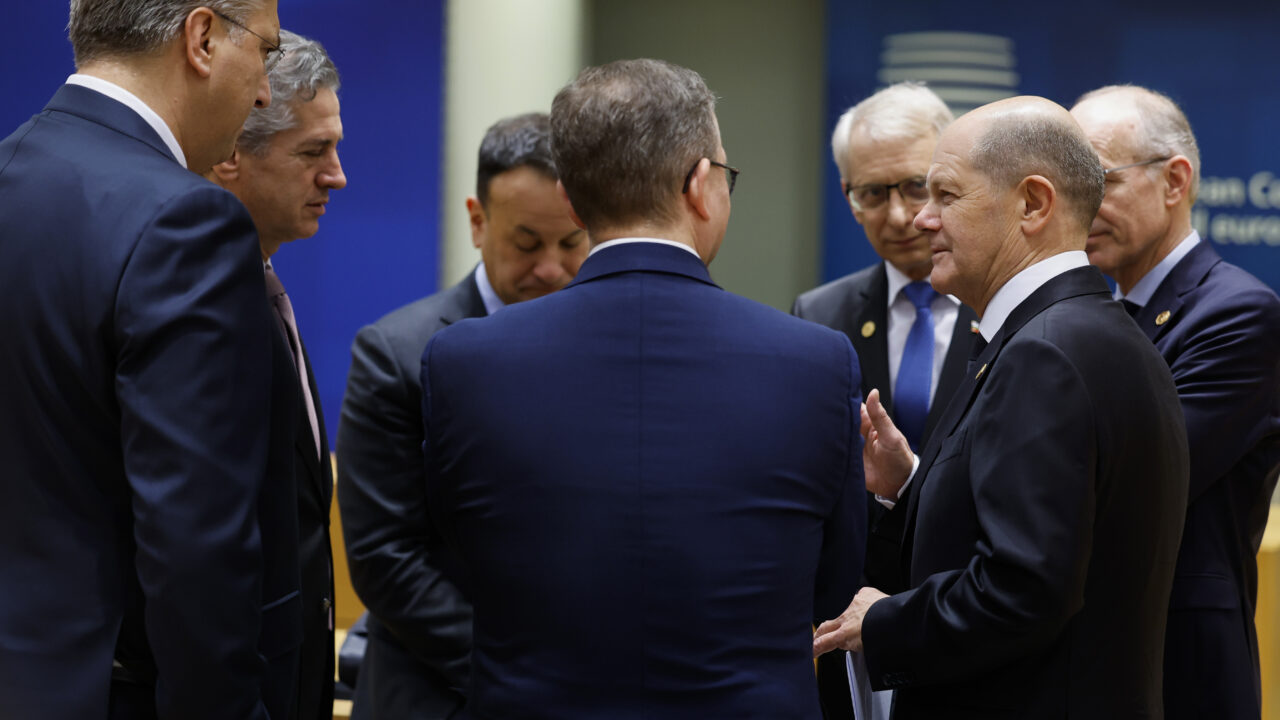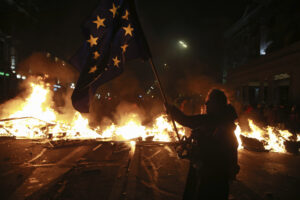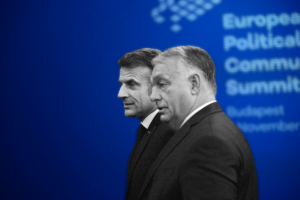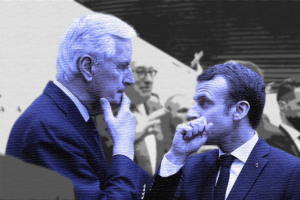EU-NATO Countries Remain Split on Escalating Middle East Conflict
As the U.S. dives plows ahead on military action against Iranian proxies in support of Israel, EU member states stand divided on pledging their support. From left, Croatia's Prime Minister Andrej Plenkovic, Slovenia's Prime Minister Robert Golob, Ireland's Prime Minister Leo Varadkar, Finland's Prime Minister Petteri Orpo, Bulgaria's Prime Minister Nikolai Denkov, Germany's Chancellor Olaf Scholz and Luxembourg's Prime Minister Luc Frieden talk during a round table meeting at an EU summit in Brussels, Thursday, Feb. 1, 2024. (AP Photo/Geert Vanden Wijngaert)
From left, Croatia's Prime Minister Andrej Plenkovic, Slovenia's Prime Minister Robert Golob, Ireland's Prime Minister Leo Varadkar, Finland's Prime Minister Petteri Orpo, Bulgaria's Prime Minister Nikolai Denkov, Germany's Chancellor Olaf Scholz and Luxembourg's Prime Minister Luc Frieden talk during a round table meeting at an EU summit in Brussels, Thursday, Feb. 1, 2024. (AP Photo/Geert Vanden Wijngaert)
As the United States plunges ever deeper into a fresh Middle East conflagration — this time fighting Iran-backed non-state actors, including Yemen’s Houthis and Shiite resistance groups in Syria and Iraq — its closest allies from the EU and NATO stand divided.
These divisions reflect a long-standing failure of the EU member states and institutions to speak with “one voice” on the Middle East.
When the U.S. called for an international coalition to stop the Yemen-based Houthi militias attacks on the international shipping in the Red Sea, only a few European nations signed the joint statement: the UK, Germany, Netherlands, Belgium, Denmark and Italy. Of that initial group, only Britain, Denmark, Netherlands, plus Greece joined as the European contingent of “Operation Prosperity Guardian.”
Others like France, while condemning the Houthi attacks, expressed preference for an autonomous, European-led operation. Still others, like Spain, were skeptical of any involvement in any anti-Houthi action whatsoever.
So far, Britain has been the only navy to engage in actual strikes against the Houthis (so far, with limited success), as part of the U.S.-led operation. Meanwhile, EU defense ministers agreed to launch the EU-led “Operation Aspides” to help guarantee free navigation and the safety of commercial traffic — initially, under Italian command.
So far, Britain has been the only navy to engage in actual strikes against the Houthis (so far, with limited success), as part of the U.S.-led operation.
Securing maritime freedom is considered vital, as approximately 40% of EU trade with Asian and Middle Eastern countries passes through the Red Sea. But the precise mandate and rules of engagement for this mission remain unclear. The EU foreign ministers are supposed to decide on those questions at their meeting on February 19. The EU high representative for foreign affairs Josep Borrell, however, seems to have ruled out anything beyond defensive actions to protect ships and intercept the Houthi attacks, including taking part in U.S.-UK-led strikes against the Houthis or conducting their own offensive strikes.
Once the EU operation is set in motion, however, that distinction might become blurred. In an interview with the Italian newspaper La Repubblica, a top Houthi leader, Mohammed Ali al-Houthi, declared that Italy will “become a target” if it participates in attacks on the group. That prompted a swift response from Italian Foreign Minister Antonio Tajani, who insisted that Rome “will not be intimidated by the Houthi threats.” Yet he was also careful to emphasize the planned mission’s defensive nature. And it is notable that neither Italy nor the EU as a whole have followed Washington’s lead in designating the Houthis as a terrorist organization.
Reactions to the U.S. strikes against Iran’s allies in Syria and Iraq — in response to the deaths of three U.S. troops caused by a drone attack on Jan. 29 — present a similarly fragmented picture. Borrell assessed those strikes as a “domino effect” resulting from the Israel-Hamas war. He called on “everybody should try to avoid that the situation becomes explosive.” Britain, predictably, supported Washington’s “right to respond to attacks” while condemning “Iran’s destabilizing activity throughout the region.”
Meanwhile, Poland’s hawkish foreign minister Radoslaw Sikorski emphasized that “Iran’s proxies have played with fire for months and years, and it’s now burning them.” The European Parliament, meanwhile, in its resolution on the situation in Gaza adopted in mid-January, pointed to Iran’s “aggressive actions and use of proxies as a means of deliberately destabilizing the region” as the principal cause of the escalation.
The rhetoric aside, there is no sign so far that the EU is gearing up to join the U.S. conflict with the Iran-backed forces in Syria and Iraq, either militarily or through diplomatic support. There are good reasons behind such restraint: the open-ended nature of the U.S. commitment increases the risks of a direct U.S.–Iran clash. That, in turn, could incentivize Iran to move aggressively to obtain a nuclear weapon as an ultimate deterrent as it’s already a de-facto nuclear threshold state.
Such a step would ruin for good any prospects for a nuclear agreement with Iran, a policy still promoted by the EU. In fact, as recently as mid-January, Enrique Mora, the political director of the European External Action Service, discussed the nuclear file with the Iranian chief negotiator Bagheri-Kani at the World Economic Forum in Davos.
Also, increased instability in Iraq and Syria and a decimation of the Shiite militias there could also create conditions for a revival of ISIS, their sworn enemies, who have committed atrocities on European soil as well as across the Middle East and beyond. EU officials have been warning about the growing risks of terrorism in Europe as a spillover from the war in Gaza for some time now.
And that brings us back to the root cause of the European divisions on the Houthis, Syria, Iraq and Iran: diverging perspectives on Israel’s campaign in Gaza. While all EU member states strongly condemned Hamas’ pogrom, their reactions belie different priorities. Some countries, such as Austria, the Czech Republic, Hungary and Germany, are closely aligned with Israel and therefore, privilege Israel’s right to self-defense.
The rhetoric aside, there is no sign so far that the EU is gearing up to join the U.S. conflict with the Iran-backed forces in Syria and Iraq, either militarily or through diplomatic support.
However, others like Spain, Belgium, Ireland, Slovenia, and, to some extent, France, see the war in Gaza and the Israel-Palestine conflict more generally as a principal cause of the expanding mayhem in the Middle East. They find it increasingly problematic to compartmentalize the Gaza carnage, Houthi attacks in the Red Sea and the growing tensions between the U.S. and Iran-backed Shiite groups in Syria and Iraq.
They think that taking a more forceful action against the “resistance front” would reduce the pressure on Israel to agree to a ceasefire in Gaza.
It is unlikely that the ruling of the International Court of Justice (ICJ) imposing a number of measures on Israel on its conduct of war in Gaza will bridge the intra-European differences, despite the EU’s professed commitment to international law. The EU emphasized that the ICJ rulings are binding and have to be implemented “fully, immediately and effectively.”
Predictably, Ireland, Belgium, Spain and Slovenia issued statements to the same effect. Germany, despite its generally pro-Israeli position, joined them. France supported the ruling but failed to call for its implementation.
The real actions, post-ICJ ruling, however, reflect the remaining deep divisions: a number of countries announced that they will suspend the funding of the United Nations Relief and Works Agency for Palestine Refugees in the Near East (UNRWA), the principal humanitarian actor in Palestine, following the accusations against some of its workers for links with Hamas. Those include Italy, Netherlands, Sweden, Finland, Austria, Romania and the Baltic states.
Others, like France and Germany, said they’ll wait for the results of the investigations on those alleged Hamas links, and still others, like Ireland, Denmark, Belgium, Luxembourg, Spain and Slovenia, pledged to continue the funding. Borrell, the EU’s top diplomat, stressed that defunding UNRWA “would amount to collective punishment” of Palestinian civilians.
To underscore the divisions further, the EU still failed to agree on sanctions against the violent Israeli settlers, due to the opposition from Hungary and Czech Republic, even though the U.S. has already announced that it will take that step.
It is, therefore, fair to expect that the EU and its member states will continue to muddle through, agreeing only on the lowest common denominator, further hobbling their capacity to act as relevant actors in the Middle East.
Your support is crucial…With an uncertain future and a new administration casting doubt on press freedoms, the danger is clear: The truth is at risk.
Now is the time to give. Your tax-deductible support allows us to dig deeper, delivering fearless investigative reporting and analysis that exposes what’s really happening — without compromise.
Stand with our courageous journalists. Donate today to protect a free press, uphold democracy and unearth untold stories.






You need to be a supporter to comment.
There are currently no responses to this article.
Be the first to respond.